History
From its original founding more than 30 years ago, the Watson School has grown from a small center to a world-class hub for research, teaching, and public engagement.
History
From its original founding more than 30 years ago, the Watson School has grown from a small center to a world-class hub for research, teaching, and public engagement.
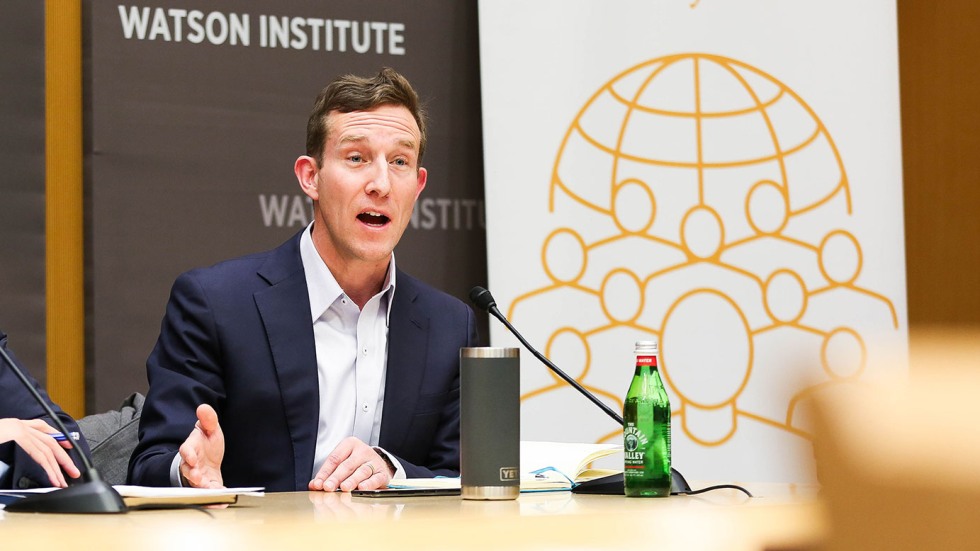
John N. Friedman is appointed the inaugural dean of the Thomas J. Watson Jr. School of International and Public Affairs at Brown University. Photo credit: Azurae Cruz
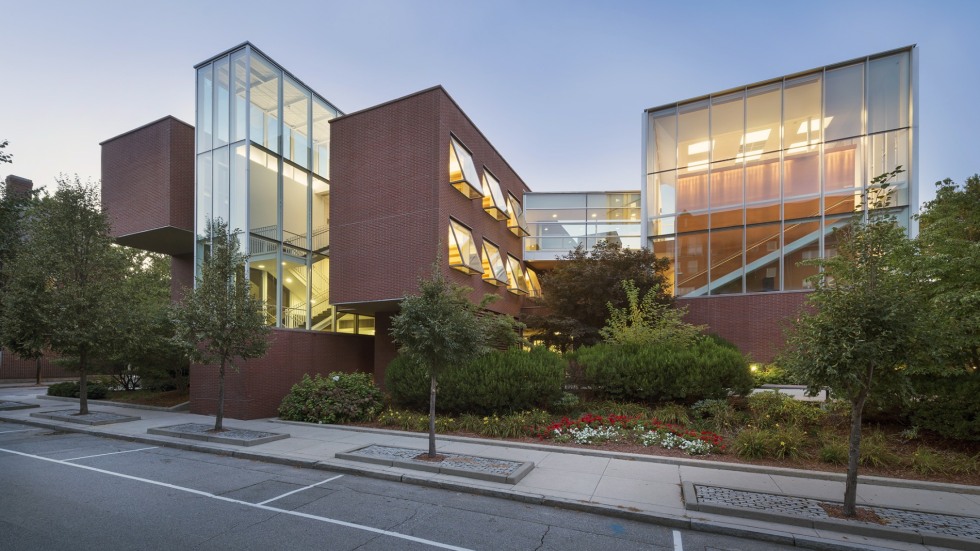
The Watson Institute for International and Public Affairs at 111 Thayer St.
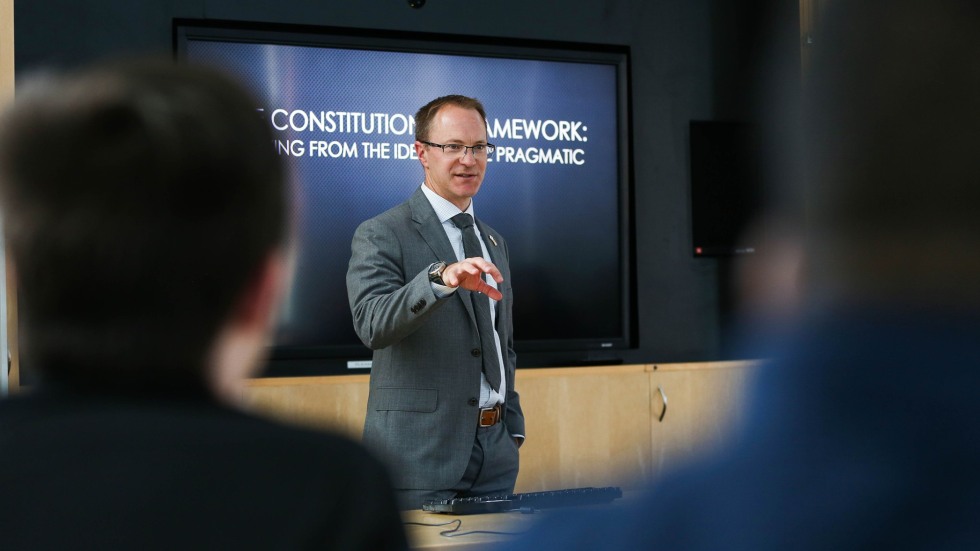
Visiting Scholar in International and Public Affairs and former Military Fellow Jonathan Bott teaching at Brown's inaugural Warrior Scholars Program, July 2023. Photo credit: Azurae Cruz
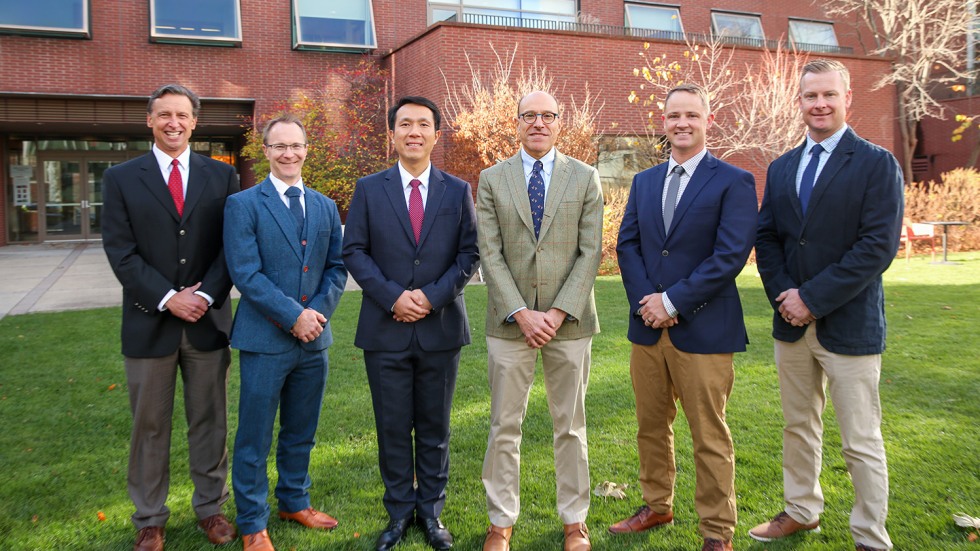
2022 Watson Military Fellows. (l-r) Director of the Military Fellows Program, David Polatty, U.S. Air Force Lt. Col. Jonathan Bott, Republic of Korea Army Major(P) Heeshik Yang, Watson Director Edward S. Steinfeld, U.S. Marine Corps Maj. Jake Lunsford, U.S. Marine Corps Lt. Col. select Trevor Tingle.
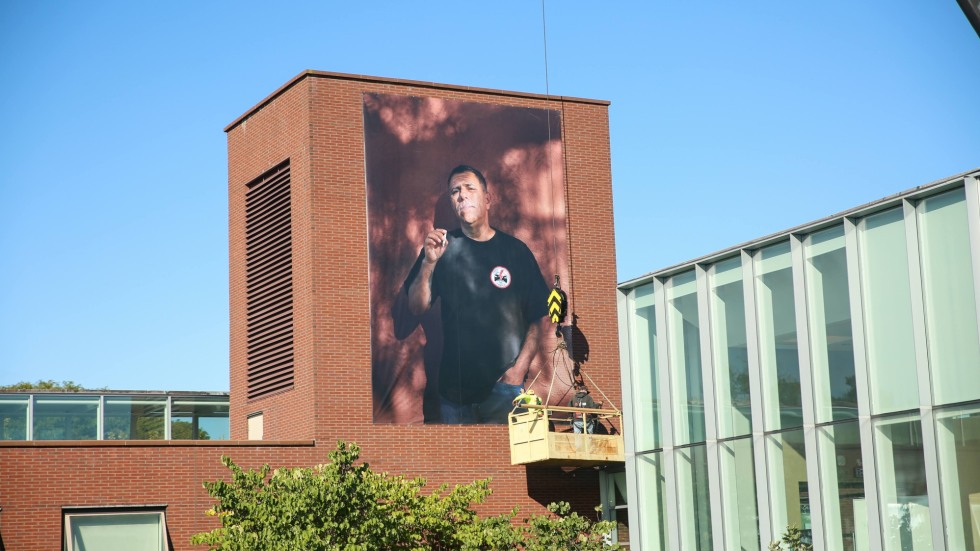
Installation of a large-scale photograph by Mary Beth Meehan on the exterior of 111 Thayer St. for Art at Watson's "Seeing Silicon Valley" exhibition in October 2021. Photo credit: Alexander Laferriere
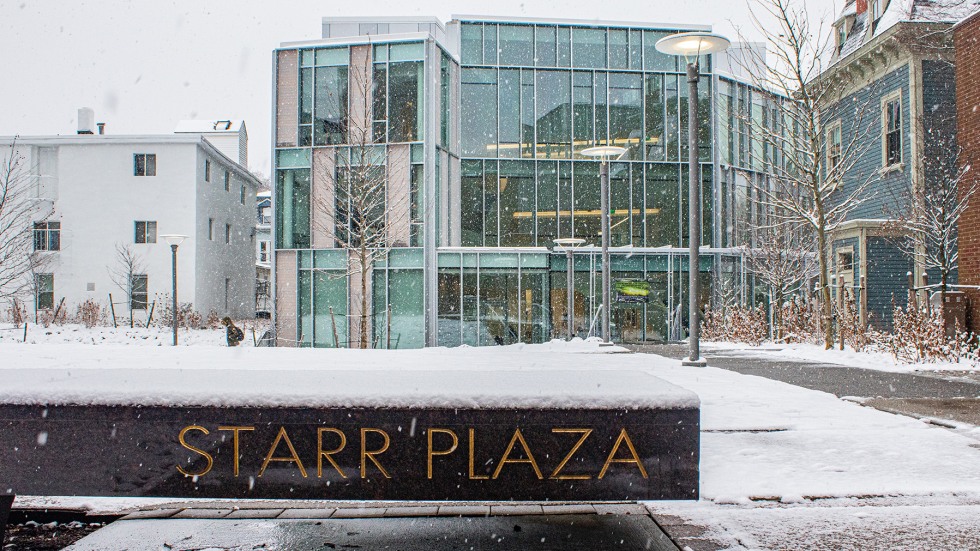
Starr Plaza, winter 2018.

The newly opened Stephen Robert ’62 Hall in 2018.
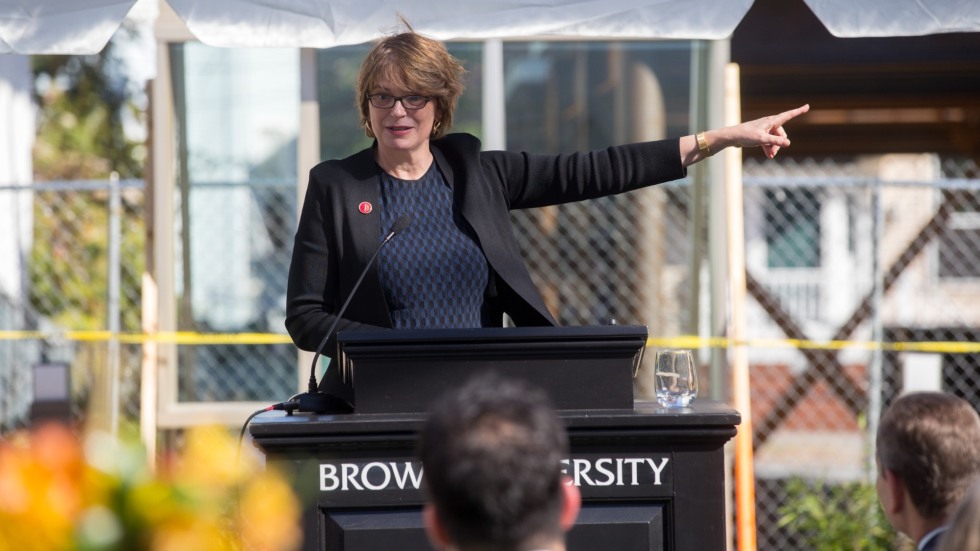
Brown President Christina Paxson speaks at the 2017 groundbreaking ceremony for the Watson Institute's expansion which includes a new building, Stephen Robert '62 Hall. Photo credit: Nick Dentamaro
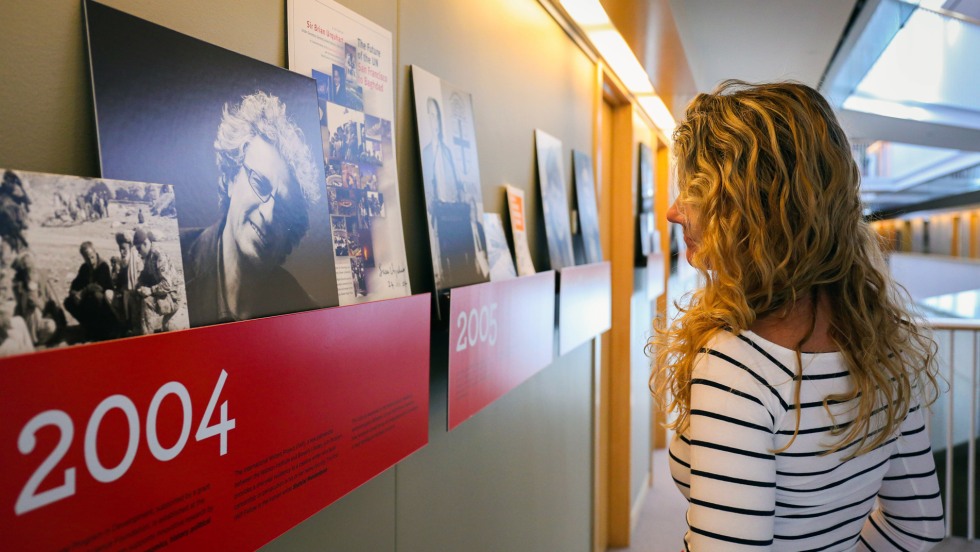
Art at Watson Presents 25 Years of Watson, one of the 2016 events celebrating the Institute's quarter-century mark.
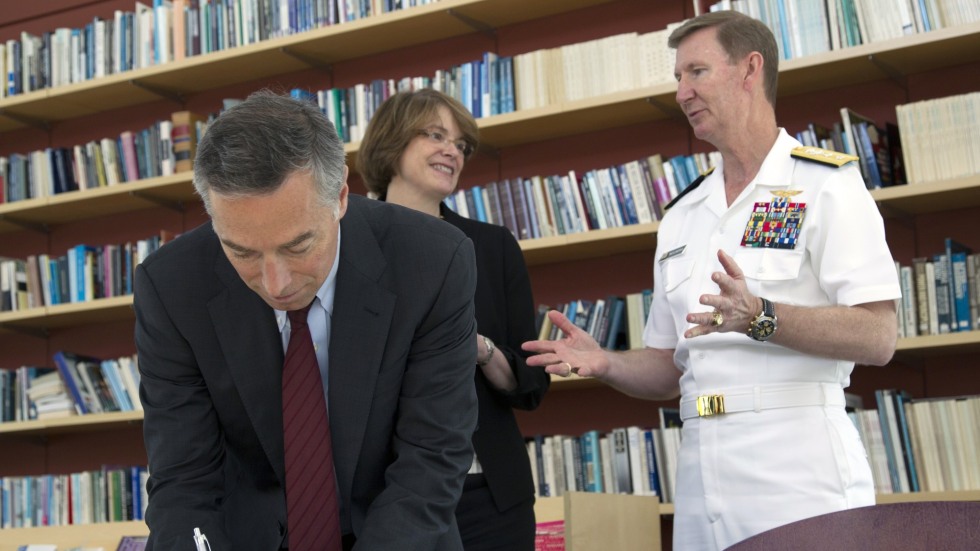
(l-r) Watson Institute Director Richard M. Locke, Brown University President Christina Paxon and Rear Admiral Walter E. "Ted" Carter Jr., president of the Naval War College, sign an agreement to promote collaborative research and teaching between the two institutions in 2014.
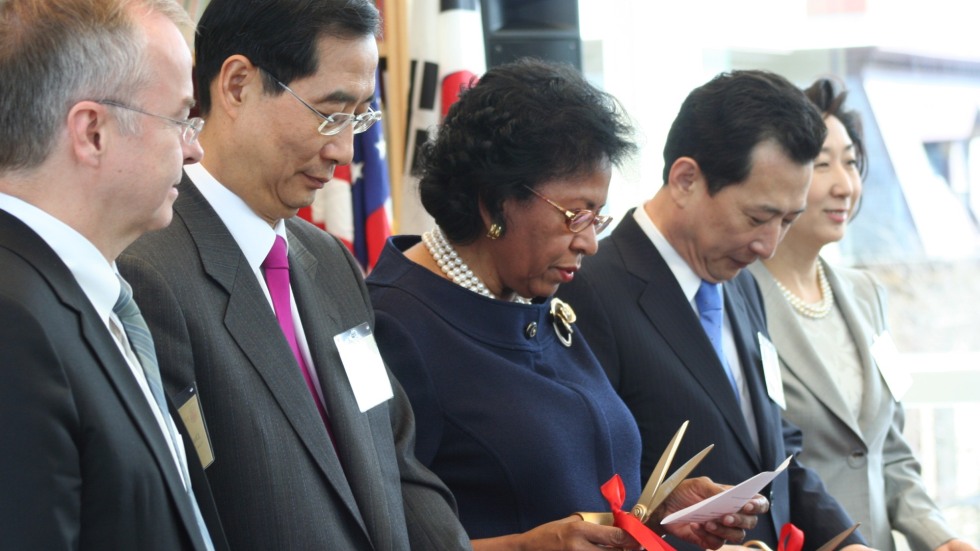
Dedication of the Institute's Library to Kim Koo in 2009. (l-r) Brown University Provost Richard M. Locke, South Korean Prime Minister Han Duck-soo, Brown University President Ruth Simmons, Kim Ho Youn P '08, Mee Kim Koo P '08.
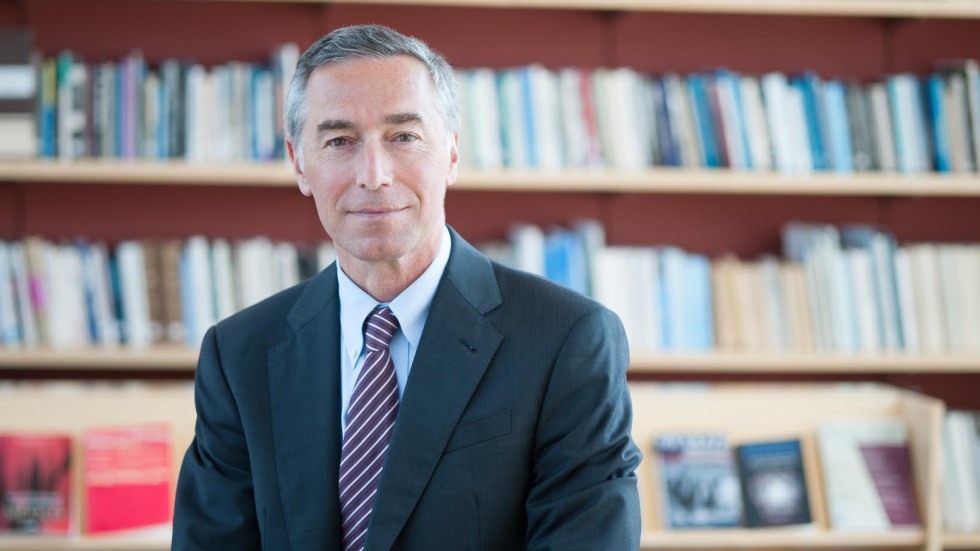
Richard M. Locke. Locke served as the Howard R. Swearer Director of the Watson Institute from 2013 to 2016 and Brown University Provost from 2015 to 2023. He currently serves as Dean of Apple University.

Brown International Advanced Research Institutes (BIARI), 2015. Photo credit: Rythum Vinoben
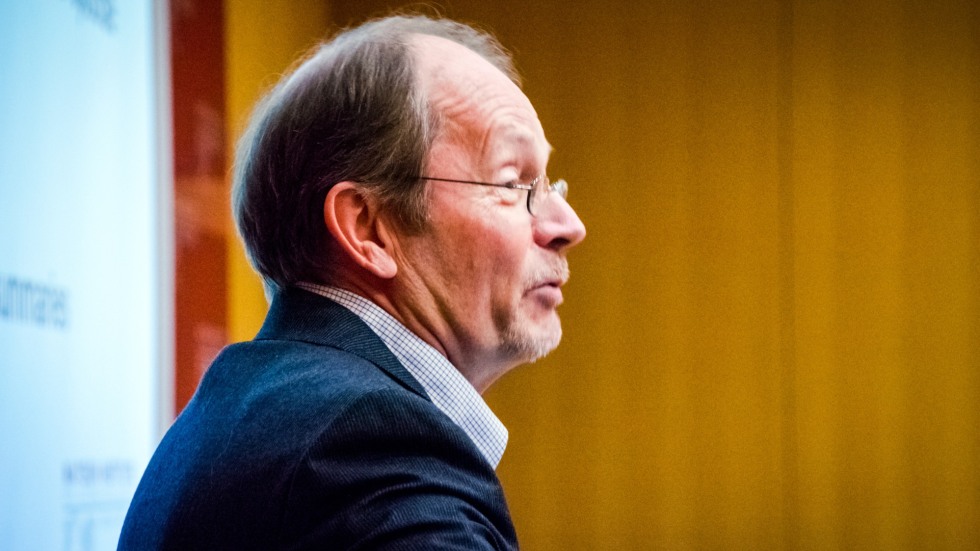
Former Watson Institute Director Thomas J. Biersteker returns to Watson to deliver a lecture, "UN Sanctions: Are Coercive Tools Effective?" in 2013. Biersteker served as Watson's director from 1994 to 2006 and was instrumental in reorganizing the Institute. Photo credit: Annika Klein
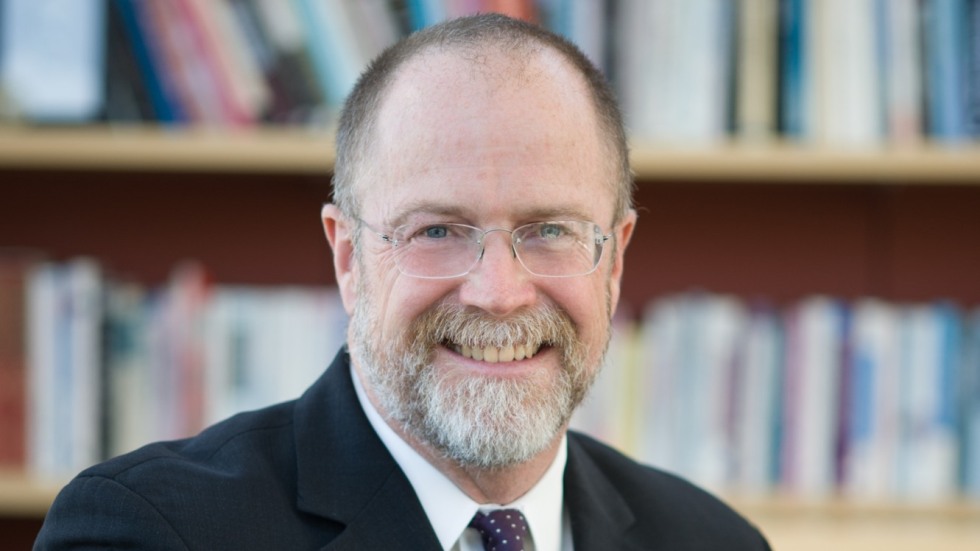
Professor of Sociology and International and Public Affairs Michael Kennedy served as the Watson Institute's director from 2009 to 2011.
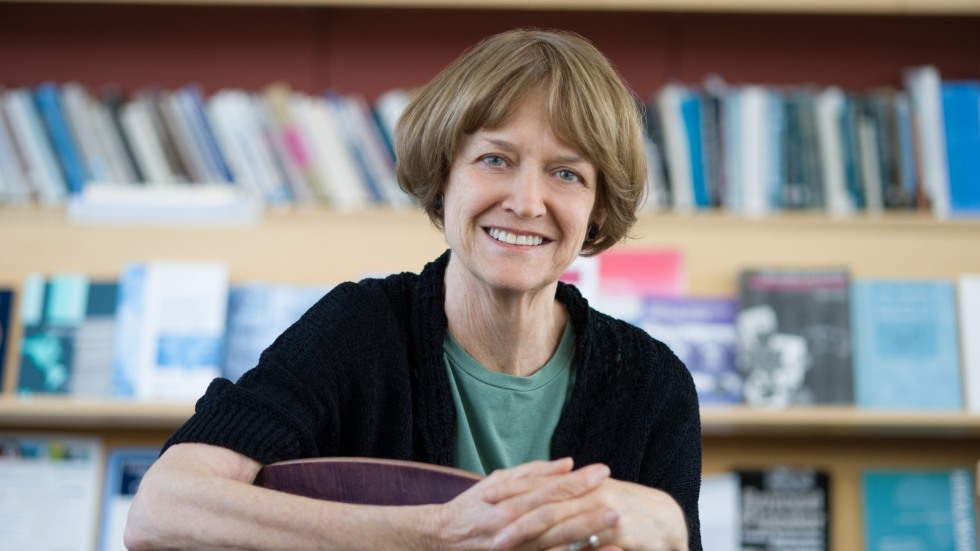
William R. Rhodes Research Professor Barbara Stallings served as the Howard R. Swearer Director of the Watson Institute for International and Public Affairs from 2006-2008.

Construction on the Watson Institute's new home at 111 Thayer St. in 2000.
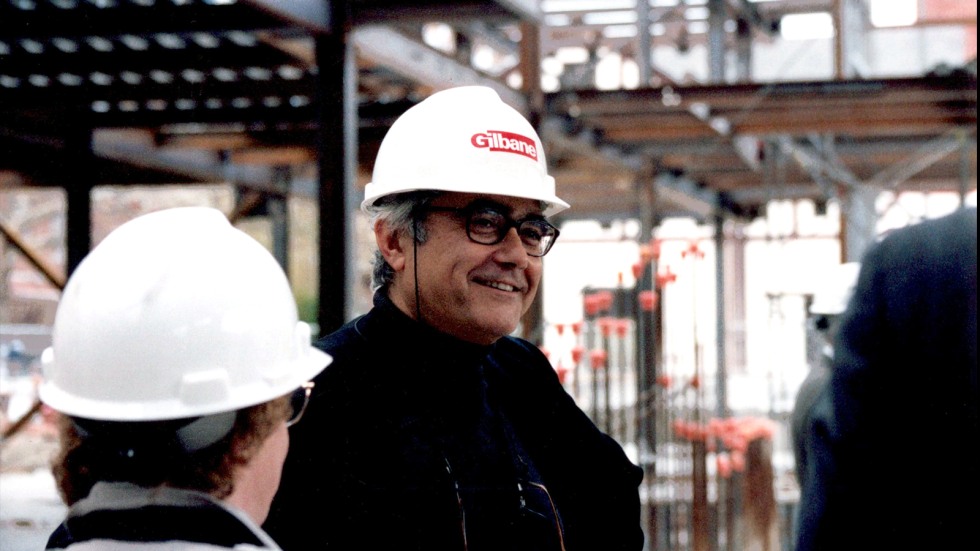
Architect Rafael Viñoly at the construction site for 111 Thayer St. in 2000.
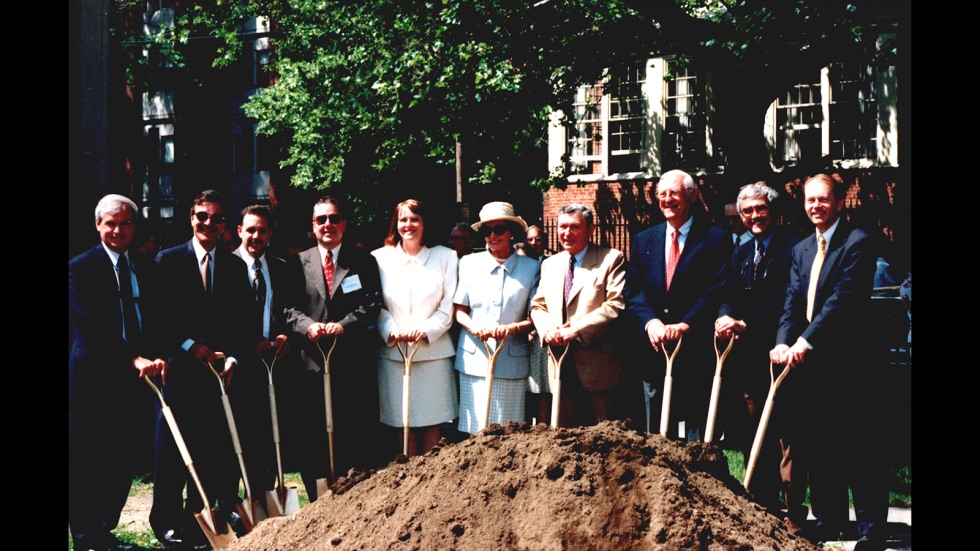
Groundbreaking on 111 Thayer St. in 1999.

Architectural drawing of 111 Thayer St. by architect Rafael Viñoly.
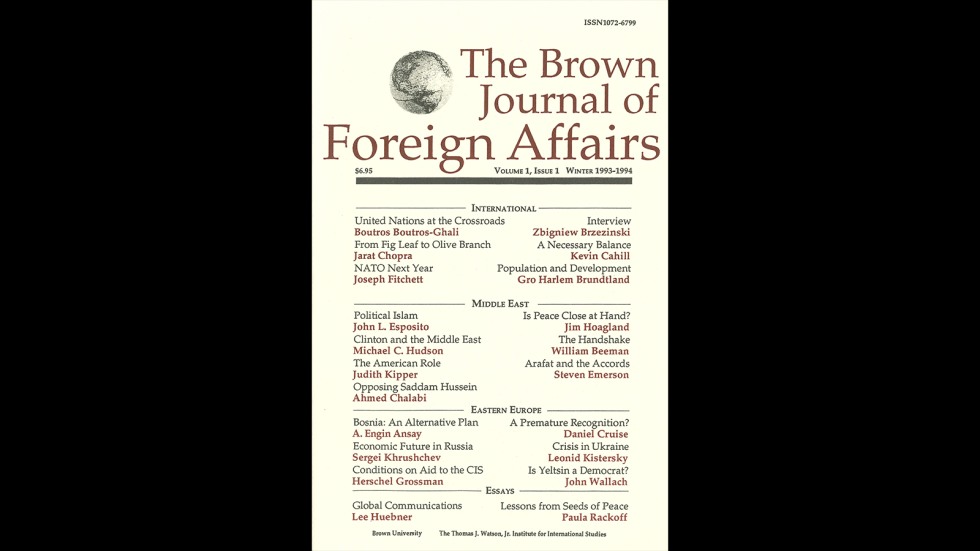
The debut issue of The Brown Journal of World Affairs, winter 1993-1994. The journal was founded by Brown University undergraduates Daniel Cruise '94, Michael Soussan '95 and Alexander Scribner '94.
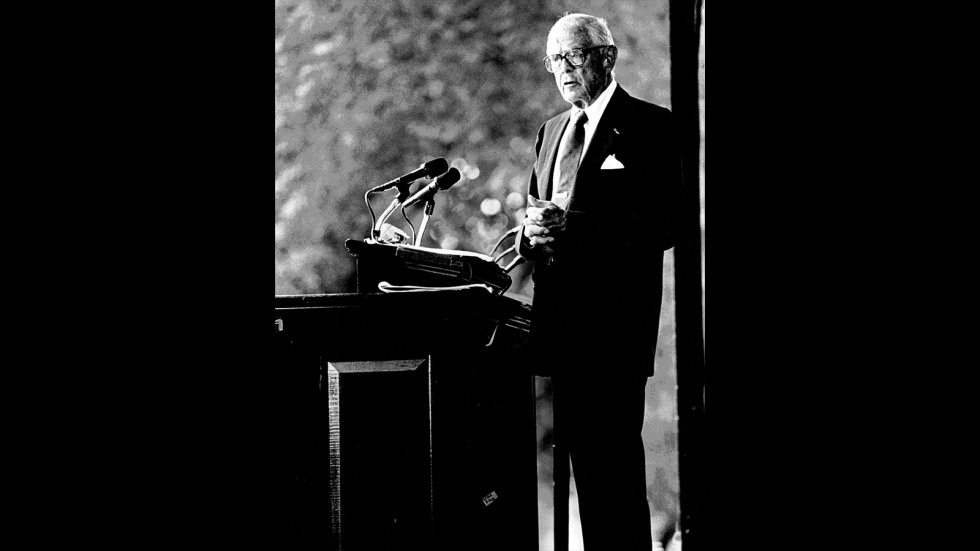
Thomas J. Watson Jr. at Brown University's 223d Commencement in 1991. As part of the weekend's commencement activities, former Soviet Foreign Minister Eduard A. Shevardnadze dedicated the Thomas J. Watson Jr. Institute for International Studies in Watson's honor.
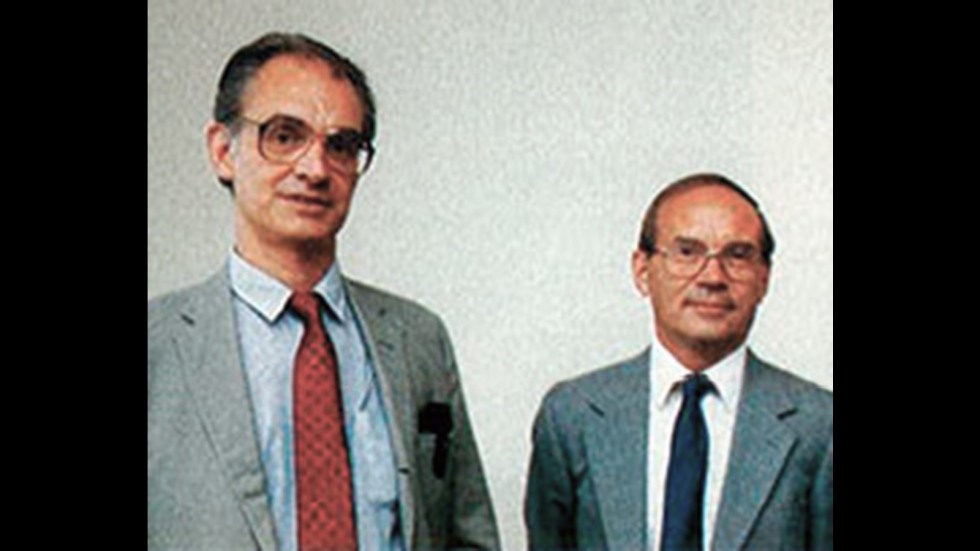
Abbott Gleason and Mark Garrison, 1990.

The Brown Satellite Project ground station, sent by the Soviet Union, is installed near the athletic center in 1990.
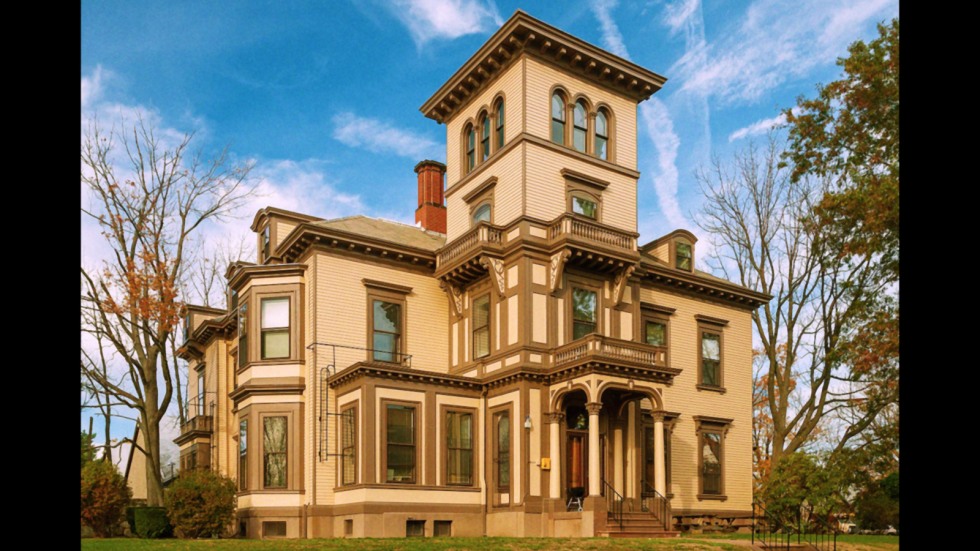
The Center for Foreign Policy Development, the Council for International Studies and Brown's Foreign Study Office were brought under one roof at 2 Stimson Ave. in 1983. Photo credit: Kenneth C. Zirkel/Wikimedia Commons

Portrait of Thomas J. Watson Jr. (1914-1993). A 1937 graduate of Brown University, Watson was the second president of IBM, the company that his father co-founded. After his retirement from IBM, he served as U.S. ambassador to the Soviet Union, holding the post from 1979 to 1981. In 1999, Time Magazine named him one of the 100 most influential people of the 20th century.
2025
- The Thomas J. Watson Jr. School of International and Public Affairs at Brown University launches on July 1, 2025.
- John N. Friedman begins his term as the inaugural dean of the Thomas J. Watson Jr. School of International and Public Affairs.
2024
- Brown University approves the establishment of an new School of International and Public Affairs, effective July 1, 2025.
- Edward S. Steinfeld completes his second term as Howard R. Swearer Director of Watson Institute.
- Steinfeld is named honorary Founding Dean of the School of International and Public Affairs.
- Wendy J. Schiller is appointed Howard R. Swearer Interim Director of Watson Institute.
2023
- The Center for Middle East Studies (CMES) and the Costs of War project examine the complicated legacy of the U.S. invasion of Iraq through webinars and a series of events.
- Art at Watson celebrates 10 years of art, education and community with "Art at Watson, Art in the World," a discussion with previously exhibited artists and curators.
- Professor of Political Science and International and Public Affairs Susan Moffitt is named Watson's director of academic programs.
- Associate Professor of the Practice of International and Public Affairs David Blanding takes over as the faculty director of the Master of Public Affairs program.
- Senior Lecturer in International and Public Affairs Anya Bassett becomes director of the International and Public Affairs concentration and director of undergraduate teaching and learning.
2022
- Parag and Usha Saxena donate $10 million to Brown University to elevate the University's groundbreaking teaching and research on South Asia and extend its global reach.
- The Center for Contemporary South Asia is renamed the Saxena Center for Contemporary South Asia in their honor.
- The Center began as the India Initiative, established in 2012.
- In response to Russian aggression against Ukraine, the Watson Institute organizes a weekly Crisis Seminar on the Invasion of Ukraine, led by Senior Fellow Lyle Goldstein. This informal discussion is complemented by Watson’s War in Ukraine lecture series, featuring experts from around the world.
- Royce Family Professor of Teaching Excellence in Political Science Wendy Schiller is named director of the A. Alfred Taubman Center for American Politics and Policy.
- Associate Professor of Political Science and International and Public Affairs Susan Moffitt is named director of Watson's Master of Public Affairs program, replacing outgoing director Eric M. Patashnik.
- In October, Art at Watson unveils an ambitious exhibition of photographs by Mary Beth Meehan entitled "Seeing Silicon Valley."
- The exhibition includes eight massive vinyl banners depicting striking images of Silicon Valley workers and residents installed on the exterior walls of 111 Thayer Street.
- Seventy undergraduates majoring in Watson's International and Public Affairs concentration, launched in 2020, graduate in May.
2021
- The Stone Inequality Initiative launches at the Watson Institute. Funded by the James M. and Cathleen D. Stone Foundation.
- The project is co-directed by James Morone, John Hazen White Professor of Political Science, Public Policy, and Urban Studies, and Margaret Weir, Wilson Professor of International and Public Affairs and Political Science.
- Its goal is to explore the detrimental effects of both inequality and great wealth on democratic institutions.
- With funding from the Carnegie Corporation of New York, the Watson Institute launches its Military Fellows Program.
- The one-year program gives U.S. and international mid-level military officers the chance to participate in security-related research, seminars, classes, and public events alongside the Institute's faculty, students, and policy practitioners.
- Watson Senior Fellow Dave Polatty is named the program's founding director.
- To mark the 20-year anniversary of 9/11, the Watson-based Costs of War releases a new report announcing the latest assessment of the human and budgetary costs of the wars in Afghanistan, Iraq and elsewhere.
- It holds an online, live-streamed event titled "20 Years Later: The True Costs of the Post-9/11 Wars" as part of a series of events exploring these wars.
- The "20 Years of War" research series, organized in partnership with the Frederick S. Pardee Center for the Study of the Longer-Range Future at Boston University, was funded by a grant from the Carnegie Corporation of New York.
2020
- Edward S. Steinfeld is reappointed as the Howard R. Swearer Director of the Thomas J. Watson Institute for International and Public Affairs.
- Steinfeld's accomplishments during his first term include expanding the Watson faculty, launching the International and Public Affairs undergraduate concentration, strengthening the Master of Public Affairs program, overseeing the creation and construction of Stephen Robert '62 Hall and raising the Institute's profile.
- In response to the emerging COVID-19 pandemic, Watson institutes COVID-Today, a series of events in which Brown faculty and visiting experts discuss the public health crisis in the U.S. and around the world.
- As part of the three-year Brown Climate Initiative, Watson establishes the Climate Solutions Lab. Directed by Jeff Colgan and Richard Holbrook, the lab focuses on overcoming barriers to confronting climate change through scholarship, learning and research-informed infrastructure changes.
- In October 2020, the Lab issues a report, Presidential Climate Action on Day One: A Foreign-Policy Guide for the Next U.S. President.
- The John F. Kennedy Jr. Initiative for Documentary Film and Social Progress, named in memory of the late Class of 1983 Brown graduate, is launched at the Watson Institute to bring film and filmmakers to the University with the goal of shedding light on some of the most urgent, challenging and complex issues facing society through the prism of documentary.
2019
- The Middle East Studies program at Watson becomes the Center for Middle East Studies, signaling a significant shift from being an undergraduate concentration to serving as a hub of Middle East-related scholarship and teaching at Brown.
- Stephen Robert '62 Hall is dedicated on May 23, one day before Commencement-Reunion Weekend.
- The Watson Institute's proposal to create a unified undergraduate concentration, International and Public Affairs (IAPA), is approved by the University.
- Through a multi-year transition, the new concentration will replace Development Studies, International Relations, and Public Policy.
- The Humanitarian Innovation Initiative becomes the Center for Human Rights and Humanitarian Studies (CHRHS), a fully endowed center within the Watson Institute.
- Dr. Adam C. Levine, MD, MPH, founding director of the Humanitarian Innovation Initiative, is also the inaugural director of CHRHS.
2018
- Stephen Robert '62 Hall, part of the Watson Institute's expansion plan, opens in December.
- The Brown in Tulsa Program, a partnership of the Watson Institute and the Tulsa-based George Kaiser Family Foundation, is launched.
- The program provides tuition relief for two master of public affairs students who commit to doing their 12-week consultancy in Tulsa and, after graduation, working for two years in one of the organizations GKFF invests in or partners with.
- In addition, the Swearer Center for Public Service agrees to place three to five undergraduates in summer internships in GKFF-related organizations.
- The Watson Institute launches a student study group led by Senior Fellow Tom Perez '83, chair of the Democratic National Committee.
- Additional groups led by Senior Fellows Michael Steele, former chair of the Republican National Committee and Jon Klein, former president of CNN/U.S., are added in subsequent semesters.
- The not-for-credit study groups help students apply theory and research to real-world challenges
- The Rhodes Center for International Economics and Finance re-opens at the Watson Institute. Political economist Mark Blyth is the director.
- After 30 years of affiliation, the Choices Program moves from the Watson Institute to the Department of History.
2017
- Ground is broken on an ambitious project that will expand the Watson Institute's footprint by 31,000 square feet. The project entails the construction of a new building and renovation of an existing one.
- The Watson Institute launches the Brown in Washington Program in partnership with the Swearer Center for Public Service at Brown University. The immersive experience blends academics, a public service internship and co-curricular experiences in Washington, D.C.
- The Africa Initiative is established. Daniel Jordan Smith is named its inaugural director.
- Associate Professor of Political Science and International and Public Affairs Susan Moffitt is named director of the A. Alfred Taubman Center for American Politics and Policy.
2016
- On January 1, Edward S. Steinfeld, the Dean's Professor of China Studies, director of the China Initiative and professor of political science, succeeds Richard M. Locke as the Howard R. Swearer Director of the Watson Institute for International and Public Affairs.
- The Brown-India Initiative and the South Asian Studies concentration merge to form the Center for Contemporary South Asia.
- The Center's aim is to develop a problem-driven, comparative and multidisciplinary approach to regional studies.
- Ashutosh Varshney continues to lead the center, and Leela Gandhi is named associate director.
- The Humanitarian Innovation Initiative is formed under the leadership of Adam C. Levine, associate professor of emergency medicine at Brown University, to improve disaster preparedness, humanitarian response and post-emergency reconstruction.
- As part of the University's Pathways to Diversity and Inclusion: An Action Plan for Brown University (DIAP), the Watson Institute convenes its Diversity and Inclusion Committee, composed of students, staff and faculty.
- The committee's initial charge is to establish goals to explore "faculty hiring and retention practices" as well as "opportunities to improve departmental culture and graduate and undergraduate experience." It is also charged with producing a diversity-and-inclusion plan, which it does in June 2016.
- The committee, which meets on a regular basis, renews the plan's goals and intentions annually.
- The Watson Institute launches Trending Globally, a biweekly podcast bridging research, politics and policy to address today's critical global challenges.
- The first episode, "Gender and the 2016 Election," features commentary from Watson political scientists Rose McDermott and Susan Moffitt.
- The Watson Institute celebrates its first quarter century.
- Special 25th Anniversary events include lectures and panels that explore current critical issues, as well as two art exhibits.
2015
- Richard M. Locke is named Brown University's 13th provost.
- Watson receives a $50-million gift which will fund the construction of a new building, expansion of the institute's faculty and initiatives aimed at deepening the University's impact in addressing some of the world's most vexing policy challenges.
- The Institute's name is changed to the Watson Institute for International and Public Affairs.
2014
- The Watson Institute and the A. Alfred Taubman Center for American Politics and Policy announce that they will begin a process of integration.
- The Watson Institute launches a newly designed, one-year Master of Public Affairs program.
- On behalf of the Watson Institute and the U.S. Naval War College, Brown University signs an agreement to promote collaborative research and teaching between the two institutions to address challenges to international security.
- The first cohort of the Watson Postdoctoral Fellows Program, re-launched by Richard M. Locke in 2013, arrives.
- Watson Fellows receive two years of support and teach one course per year while they pursue their research and participate in the intellectual life of the Institute. They also convene monthly during the academic year to present their works in progress.
2013
- Richard M. Locke, an internationally respected scholar and authority on international labor rights, comparative political economy, employment relations and corporate responsibility, begins his tenure as the Howard R. Swearer Director of the Watson Institute.
- The China and Brazil Initiatives are established at the Institute.
- Art at Watson's first show opens. Abbott Gleason Pictures: 1961-2013 exhibits drawings and paintings by Watson's former associate director.
2012
- Christina H. Paxson, an economist and former dean of Princeton's Woodrow Wilson School of Public and International Affairs, begins her term as the 19th president of Brown University.
- The Brown-India Initiative is established with Professor Ashutosh Varshney as its inaugural director.
- Historian Beshara Doumani comes to Brown from the University of California, Berkeley, to expand the undergraduate program in Middle East Studies into one of the Institute's core centers for area studies.
- The Art at Watson committee is formed with a charge to exhibit works by students, faculty, and staff from Brown, as well as works by artists from the broader community that relate to the Institute's mission.
2011
- Watson Institute Professor Catherine Lutz and Boston University Professor Neta Crawford found the Costs of War research initiative, a comprehensive accounting of the costs — human, economic, social, and political — incurred by the U.S. wars in Afghanistan, Iraq, and Pakistan. The project brings together 30 experts from institutions across the U.S. and Canada.
- During a two-year search for a permanent director, Carolyn Dean, professor of history and Peter Andreas, professor of political science and international studies, agree to serve as interim directors for one year.
2010
- The Review of International Political Economy establishes its new editorial headquarters at the Watson Institute.
- The documentary film "Human Terrain: War Becomes Academic," co-written and co-directed by Institute research professor James Der Derian, is released.
2009
- The Institute's library is dedicated to Kim Koo, premier of the Korean Provisional Government and leader of the Korean independence movement of 1910-1945. The dedication was made possible by a gift from the Kim Koo Foundation.
- Michael D. Kennedy, a sociologist from the University of Michigan, is named director of the Institute.
2008
- David Kennedy, previously the vice-president for international affairs at Brown, is named Institute director.
- Outgoing director Barbara Stallings resumes her work as a full-time Watson faculty member.
- "Virtual JFK: Vietnam if Kennedy Had Lived," directed by Visiting Fellow Koji Masutani and produced by Professors James G. Blight and Janet M. Lang, premiers to critical acclaim.
- Brown University and Banco Santander announce a plan to inaugurate an annual series of Brown International Advanced Research Institutes (BIARI), which will bring a rising generation of scholars, primarily from the Global South, to the Institute to learn and share knowledge.
2007
- The Watson Institute launches a three-year Globalization and Inequality Initiative under the leadership of director Barbara Stallings.
- Richard C. Holbrooke, former U.S. ambassador to the United Nations and Germany and a 1962 Brown graduate, is appointed to a five-year term as a professor at large based at the Institute.
2006
- William R. Rhodes Research Professor and head of Watson's Political Economy and Development Program Barbara Stallings, is named director of the Watson Institute.
- The Watson Institute directorship is renamed in honor of Howard R. Swearer.
- Brown University President Ruth J. Simmons sets out an ambitious agenda to internationalize Brown University, with the Watson Institute playing a leading role in making Brown a truly global university.
2005
- With the help of a multimillion-dollar grant from the estate of Thomas J. Watson Jr. and Olive C. Watson, the Institute endows several new positions and embarks on a five-year strategic plan to further facilitate the translation of Institute research into policy practice.
- After more than a decade of leadership, Thomas J. Biersteker announces that he plans to step down as Institute director.
- The Political Economy and Development program becomes the editorial home for the highly regarded international journal Studies in Comparative International Development.
2004
- A new partnership between the Watson Institute and Brown's Literary Arts Program, the International Writers Project (IWP), provides a one-year residency to a creative writer who faces censorship or persecution in his or her home country.
- Iranian novelist Shahrnush Parsipour is named the first IWP fellow.
- The Cultural Awareness in the Military project, headed by anthropologists and Watson Institute faculty members, Catherine Lutz and Keith Brown, examine how U.S. armed forces integrate cultural knowledge in their training and strategic practices.
2003
- The Targeted Financial Sanctions Project hosts representatives from all 15 members of the United Nations Security Council for a workshop, training and simulation exercises to examine sanction reform processes.
- On Sept. 29, the Watson Institute hosts former Soviet President Mikhail Gorbachev, who delivers the Stephen J. Ogden Jr. '60 Memorial Lecture on International Affairs.
2002
- The Institute moves to its new home at 111 Thayer Street.
- Watson Institute faculty and staff rapidly organize research and teaching initiatives to explore issues related to international terrorism in the wake of the 9/11 terrorist attacks and the subsequent "global war on terror."
- The Choices Program curriculum staff mobilizes to create a five-day unit for high school students titled "Responding to Terrorism: Challenges for Democracy."
- The unit garners media attention and is used in more than 1,000 high schools in 2002 alone.
2001
- On July 3, Ruth J. Simmons makes history as the first female president and the first African American president of an Ivy League university when she is sworn in as Brown University's 18th president.
- In partnership with the Luce Foundation, the Watson Institute invites seven mid-career environmental leaders — Watson Scholars — from universities, governments and non-governmental organizations in the Global South to participate in a series of interdisciplinary courses on environmental topics throughout the spring semester.
2000
- Abbott Gleason, Brown professor of history and former Watson Institute associate director, serves as Institute director while Thomas J. Biersteker takes a yearlong sabbatical.
- In February, E. Gordon Gee announces that effective April 15, he will leave Brown University to become chancellor of Vanderbilt University.
- In the wake of 1999's VirtualY2K conference on digital technologies and security, Professor James Der Derian begins the Information Technology, War, and Peace Project with support from the Ford Foundation to investigate the use of new network and information technology in war and diplomacy.
- Construction continues on the new Watson Institute building at 111 Thayer Street.
1999
- The groundbreaking ceremony for the new Watson Institute building at 111 Thayer Street takes place in May.
- In conjunction with the ceremony, Her Majesty Queen Noor of Jordan gives the Stephen A. Ogden Jr. Memorial Lecture on International Affairs.
- The Watson Institute assumes editorship of the journal International Studies Review (ISR).
- Under the guidance of Editor Linda B. Miller, an Institute adjunct professor and Wellesley College professor of political science, the Institute's first issue of ISR comes out in the spring.
1998
- In January E. Gordon Gee is named Brown University's 17th president and joins the Watson Institute's Board of Overseers.
1997
- The Brown University Academic Council approves the Institute restructuring in April.
- After more than two years of planning, two teams of scholars, former government policymakers and military leaders from Vietnam and the United States meet face-to-face in Hanoi to revisit the lessons and missed opportunities of the Vietnam War. The historic conference is organized by Watson Professor James G. Blight.
- President Vartan Gregorian leaves Brown to head the Carnegie Corporation of New York.
- Planning begins for a new building to house the Watson Institute, bringing together its constituent programs — previously dispersed across five campus locations — under one roof.
- An international competition for the building’s design is announced, with a selection committee chaired by John Carter Brown III, director of the U.S. National Gallery of Art.
- Architects from around the world participate, including I.M. Pei, Yoshio Taniguchi and Zaha Hadid.
- Rafael Viñoly Architects of New York is announced as the winner of the competition.
1996
- The Humanitarianism and War Project begins at the Institute under the direction of Thomas Weiss.
1995
- Thomas J. Biersteker proposes reorganizing the Institute around four central themes.
- Global Security
- Political Economy and Development
- Politics, Culture and Identity
- Hunger, Health, Population and the Environment.
- Watson's Board of Overseers approves Biersteker's proposed restructuring in November.
- Directors are named for each of the Institute's four research areas.
- P. Terrence Hopmann, professor of political science, heads the Global Security Program.
- Robert Wade, professor of political science and international political economy, directs the Political Economy and Development Program.
- David I. Kertzer, professor of anthropology and history, directs the Politics, Culture, and Identity group.
- Watson Institute Director Thomas J. Biersteker oversees the Hunger, Health, Population, and Environment (HHPE) Program.
- The HHPE program soon evolves into the Global Environment Program, directed by Steven Hamburg.
1994
- Thomas J. Biersteker, the Luce Professor of Transnational Organizations in Political Science, is appointed director of the Watson Institute for International Studies, with a mandate to restructure it.
1993
- Thomas J. Watson Jr. dies.
- Brown University undergraduates Daniel Cruise '94, Michael Soussan '95 and Alexander Scribner '94 found the Brown Journal of World Affairs.
- Funded by the Watson Institute, the magazine features essays written by world leaders, academics and policymakers.
1991
- Following a vote by the Corporation, Brown President Vartan Gregorian rededicates the Institute for International Studies in the name of Thomas J. Watson Jr.
- Soviet Foreign Minister Eduard A. Schevarnadze gives the keynote address at the dedication ceremony.
- After 10 years as an independent research organization, the Center for Foreign Policy Development (CFPD) becomes part of the newly renamed Watson Institute for International Studies.
- Institute director Howard R. Swearer dies.
- Brown President Vartan Gregorian becomes acting director of the Watson Institute.
- Sergei Khrushchev, son of former Soviet Premier and Communist Party Chief Nikita Krushchev, comes to the CFPD as a visiting scholar and later becomes a senior fellow at the Institute.
1990
- The Brown Satellite Project, a video teleconferencing service between Brown and the Soviet Space Program, is established.
- The Soviets ship a complete ground station to the University, which is installed near the athletic center.
1989
- Howard R. Swearer steps down as president of Brown University and is succeeded by Vartan Gregorian, Brown's first foreign-born president.
1988
- The Choices for the 21st Century Program is established as a project of the Center for Foreign Policy Development.
- Choices combines the scholarly resources of the University with the pedagogical expertise of classroom educators to research and write curricula for high school students on a range of foreign policy issues.
- The program's goals include promoting public interest in foreign policy issues, improving participatory citizenship skills and encouraging public judgment on policy priorities.
- Susan Graseck, who has a background in education and foundation work, is named the program's first — and to date only — director.
1986
- The Institute for International Studies is formally inaugurated.
- Speakers at the ceremony marking this event include former U.S. Senator J. William Fulbright, President Jimmy Carter and former Secretary of State Cyrus Vance.
- The focus of the Institute is to be "teaching and research concerned with international relations and foreign cultures ... through centers and programs which draw faculty and students from all parts of the University, as well as visiting scholars and guests who participate in and advance the Institute's objectives."
- Howard R. Swearer, while still president of the University, becomes the Institute's first director.
- The Council for International Studies is folded into the new Institute.
1985
- In a memo outlining the "next steps" for enhancing international studies at Brown, President Howard R. Swearer proposes the creation of a broad-based institute to draw together many of the international studies programs in a "collaborative, reasoned and reinforcing manner."
- The institute proposal is approved by the Corporation in May.
- Brown President Howard R. Swearer announces the creation of the Institute for International Studies at Brown's Opening Convocation in September.
- P. Terrence Hopmann comes to Brown from the University of Minnesota to direct the International Relations (IR) concentration program.
1984
- The Center for Latin American and Caribbean Studies (CLACS) is established.
1983
- The Center for Foreign Policy Development (CFPD), the Council for International Studies and Brown's Foreign Study Office move to 2 Stimson Avenue, which becomes the first building at Brown University wholly dedicated to international studies.
- Professor of History Abbott Gleason returns from Washington, where he had been serving as Secretary of the Kennan Institute at the Smithsonian.
- Gleason and Mark Garrison co-edit a book, "Shared Destiny: Fifty Years of Soviet-American Relations," based on a lecture series sponsored by the CFPD and the World Affairs Council of Rhode Island.
- Richard Smoke, co-founder and former executive director of the Center for Peace and Common Security, and Jan Kalicki, former senior foreign policy advisor to Senator Edward M. Kennedy and a former investment banker, join CFPD as research director and executive director, respectively.
1982
- The Center for Foreign Policy Development acquires formal status at Brown University when it is incorporated as an independent non-profit research organization. Thomas J. Watson Jr. is named chair of the board. Howard R. Swearer and Mark Garrison are also named board members.
1981
- Mark Garrison, Ambassador Thomas J. Watson Jr.'s deputy in Moscow, is invited to Brown University to become the first appointed fellow of the Council for International Studies and the founding director of the Center for Foreign Policy Development. Its focus is U.S.-Soviet nuclear weapons issues and East-West security issues generally.
1980
- Thomas J. Watson Jr., former IBM president and then U.S. ambassador to the Soviet Union — and a 1937 graduate of Brown University — invites Brown President Howard R. Swearer, a specialist on Soviet politics, to come to Moscow to discuss the creation of a "think tank" at Brown University, where scholars and practitioners could work together on nuclear strategy and U.S.-Soviet relations, and develop policy proposals for dealing with them.
1979
- Lacking a mechanism for linking and coordinating the various elements that constitute international studies on campus, Brown University launches the Council for International Studies (CFIS) to fulfill this need.
- CFIS's mission is to coordinate the faculty and academic units at the University working on international studies.
- Like the Watson Institute of today, the center was formed to explore solutions to the major global issues of the day, foremost of which was the possibility of a nuclear encounter between the United States and the Soviet Union.
- Brown President Howard R. Swearer asks Professor of Political Science Newell Stultz to become the council's first — and, ultimately, only — director.